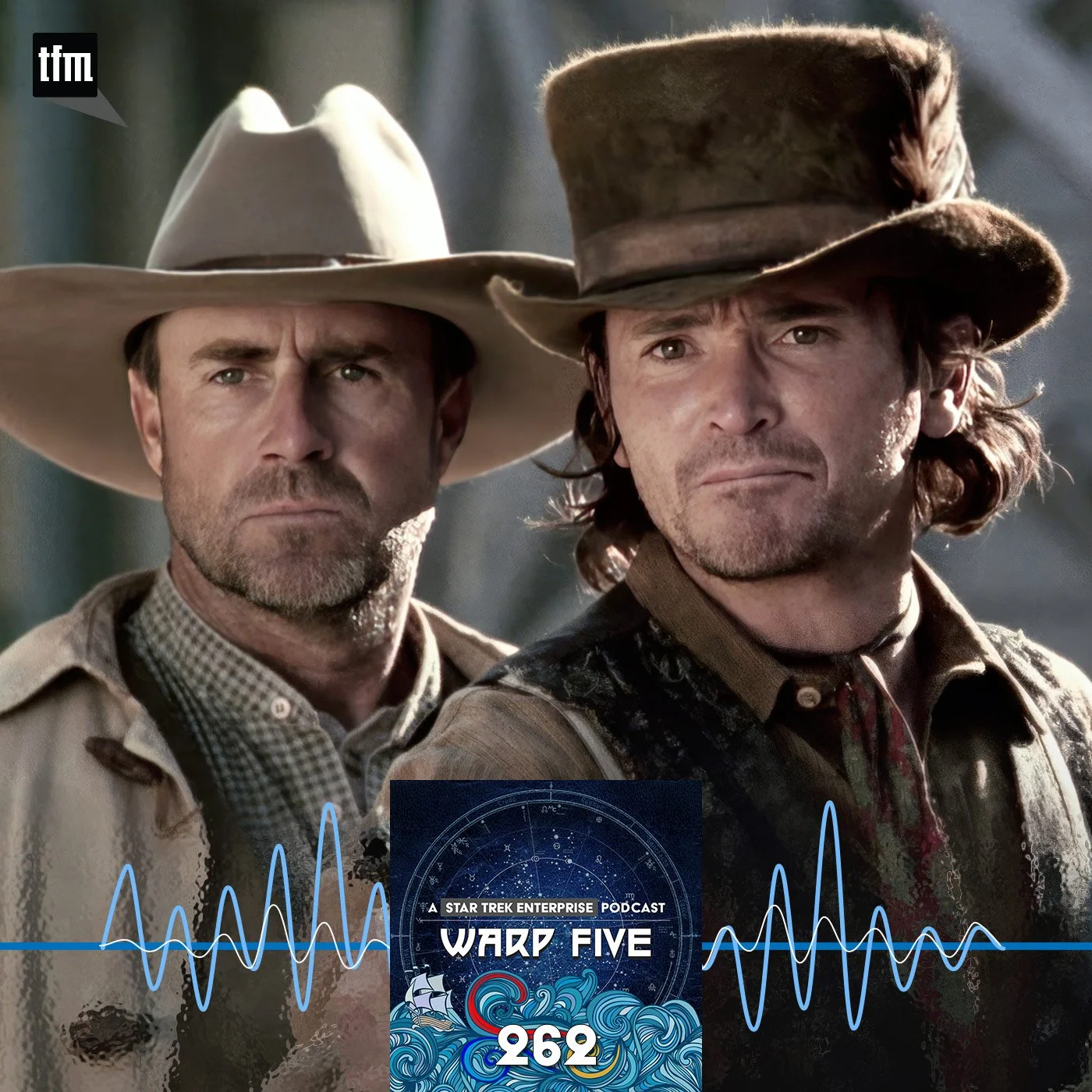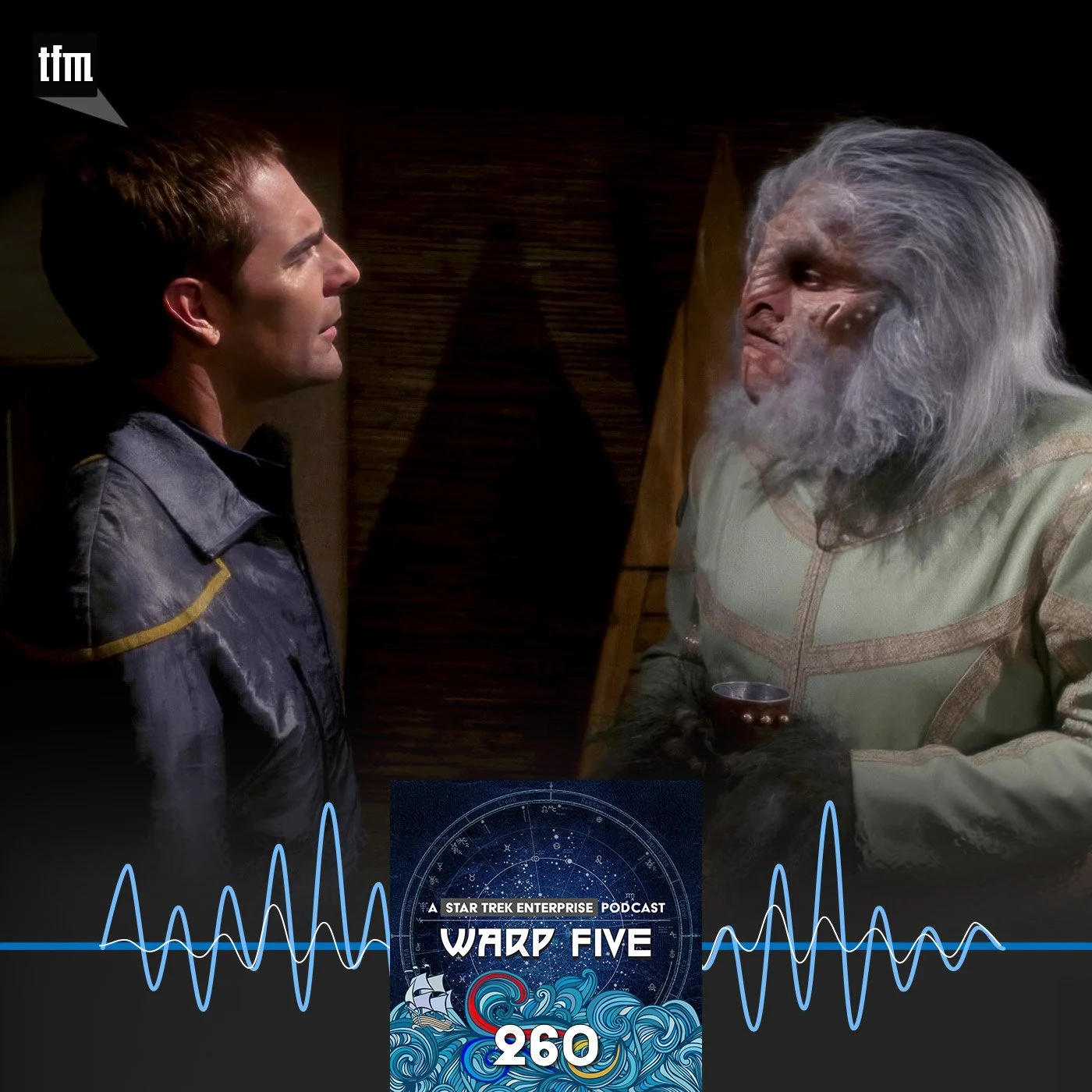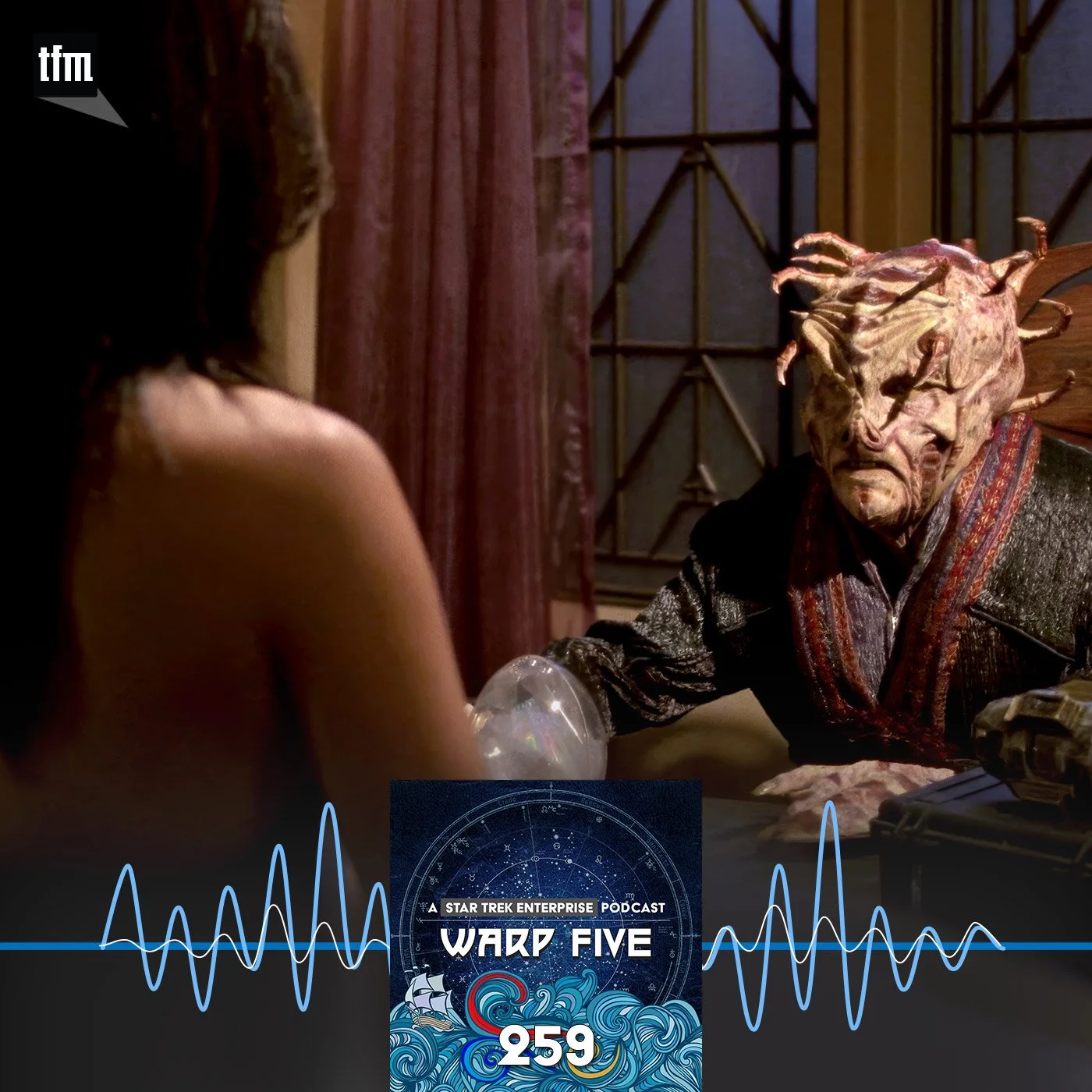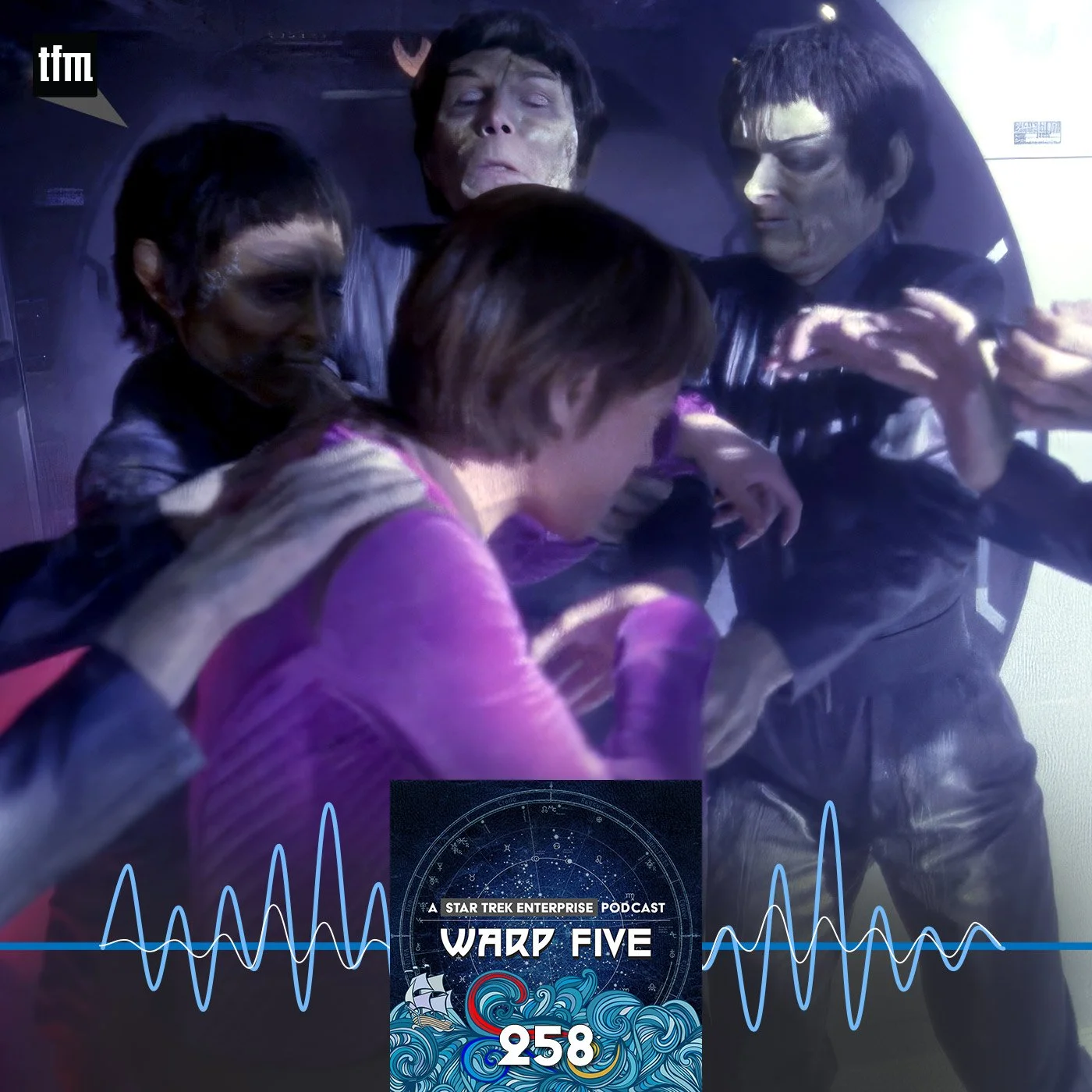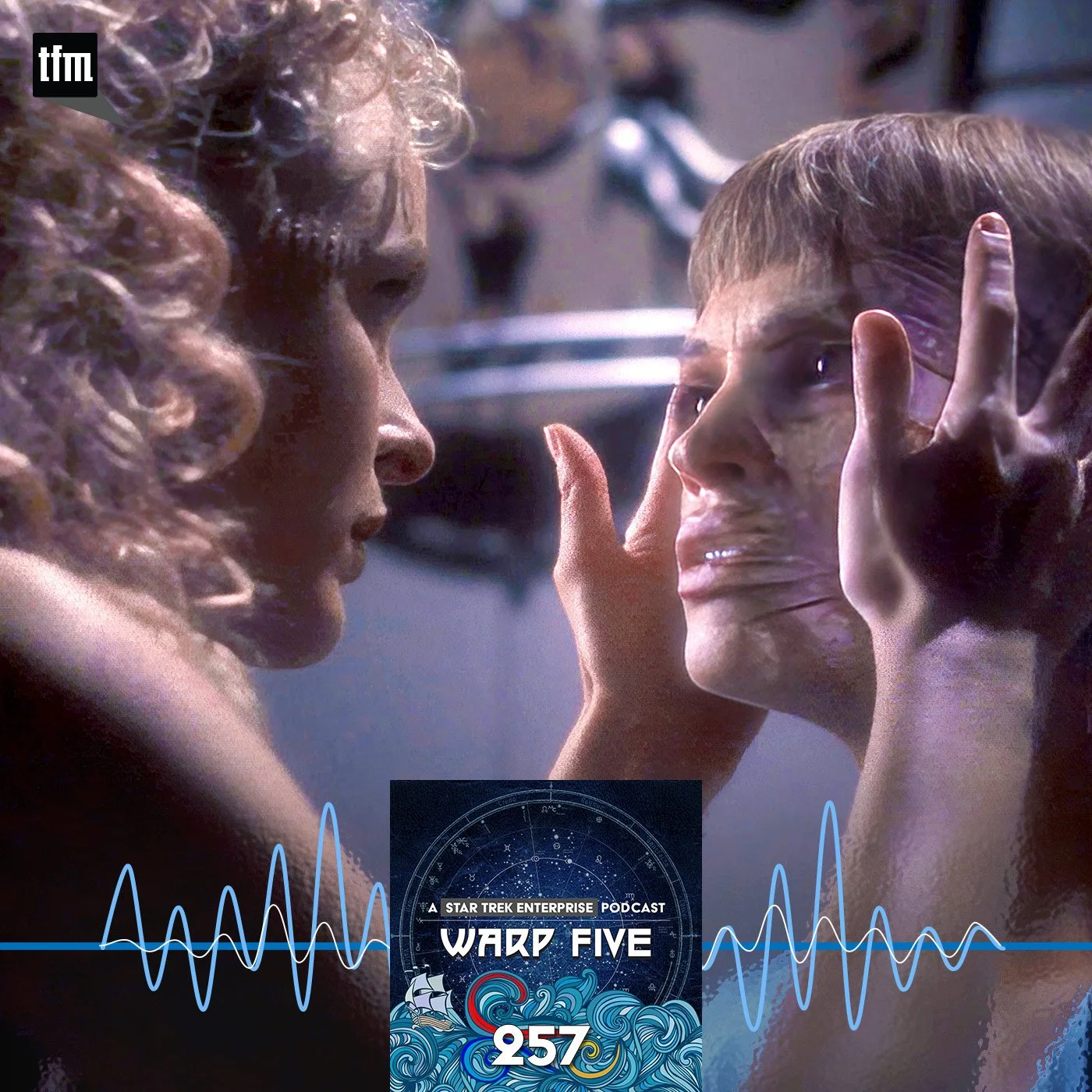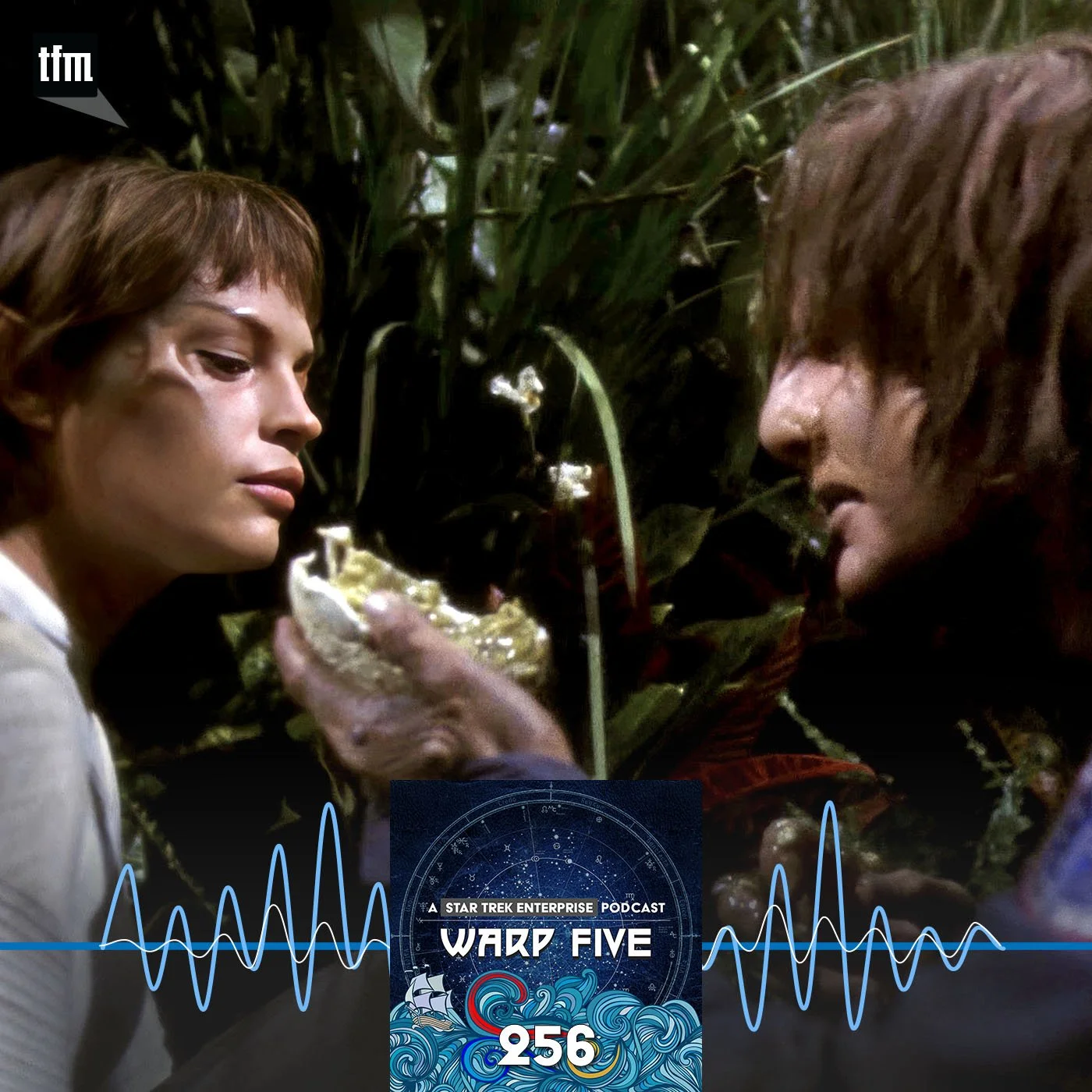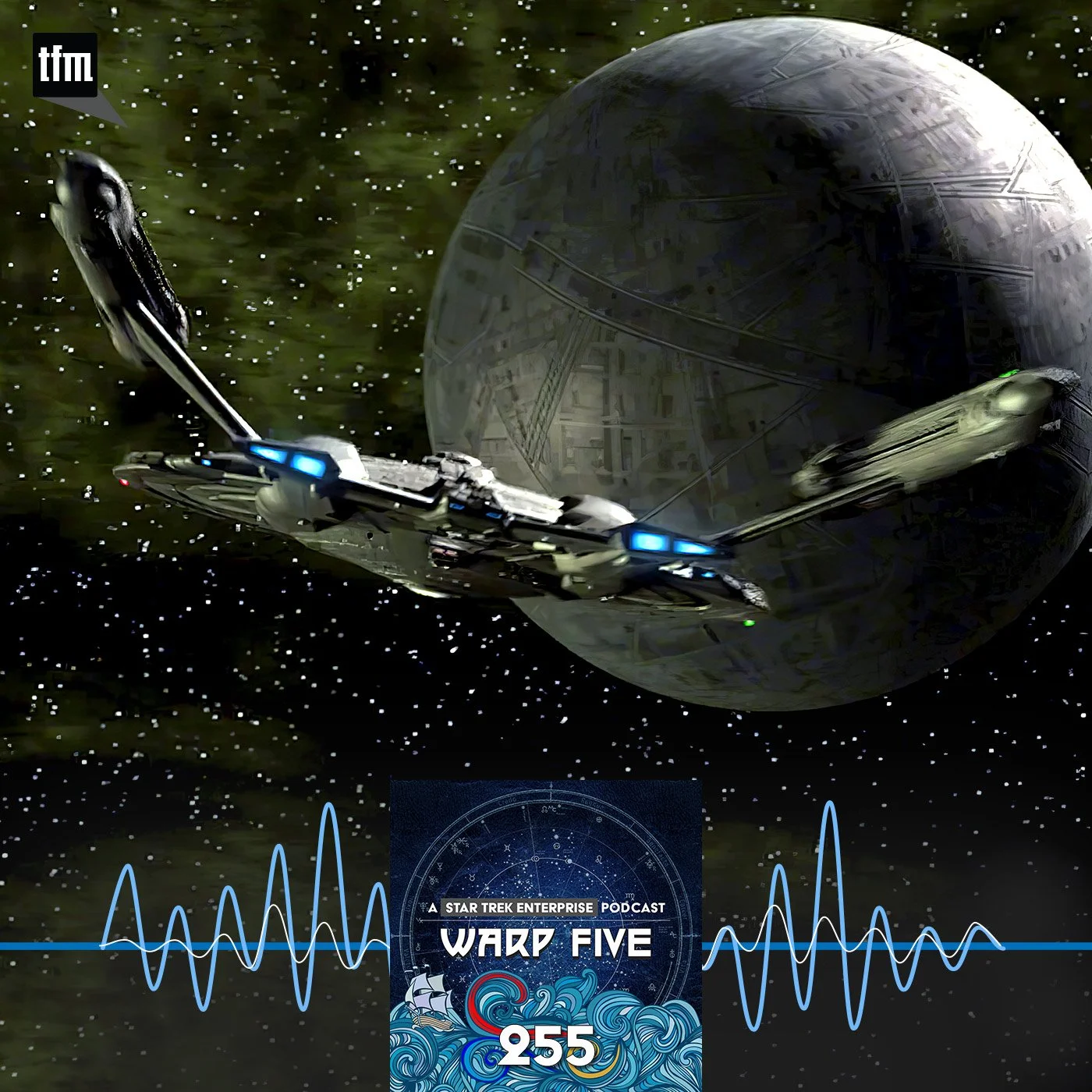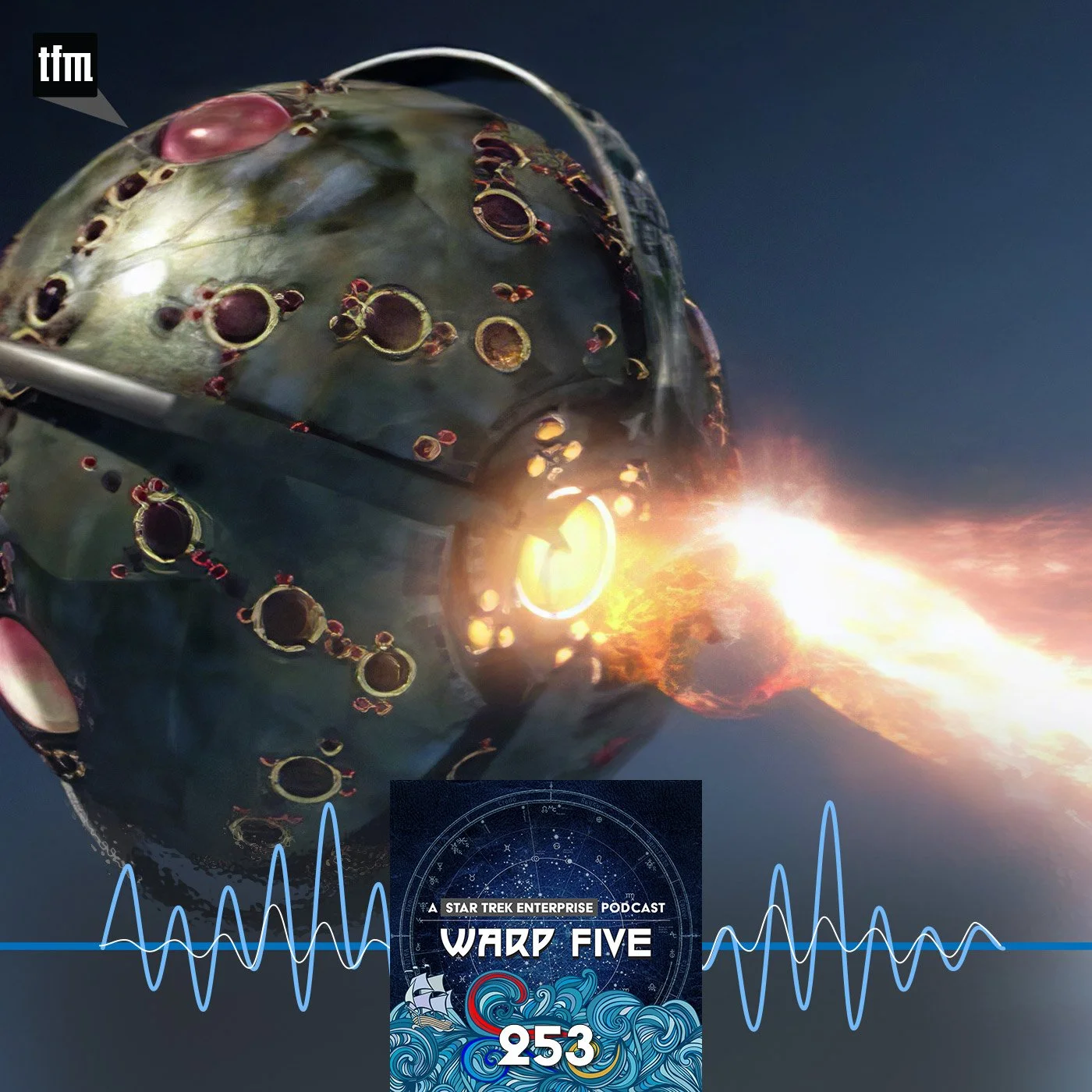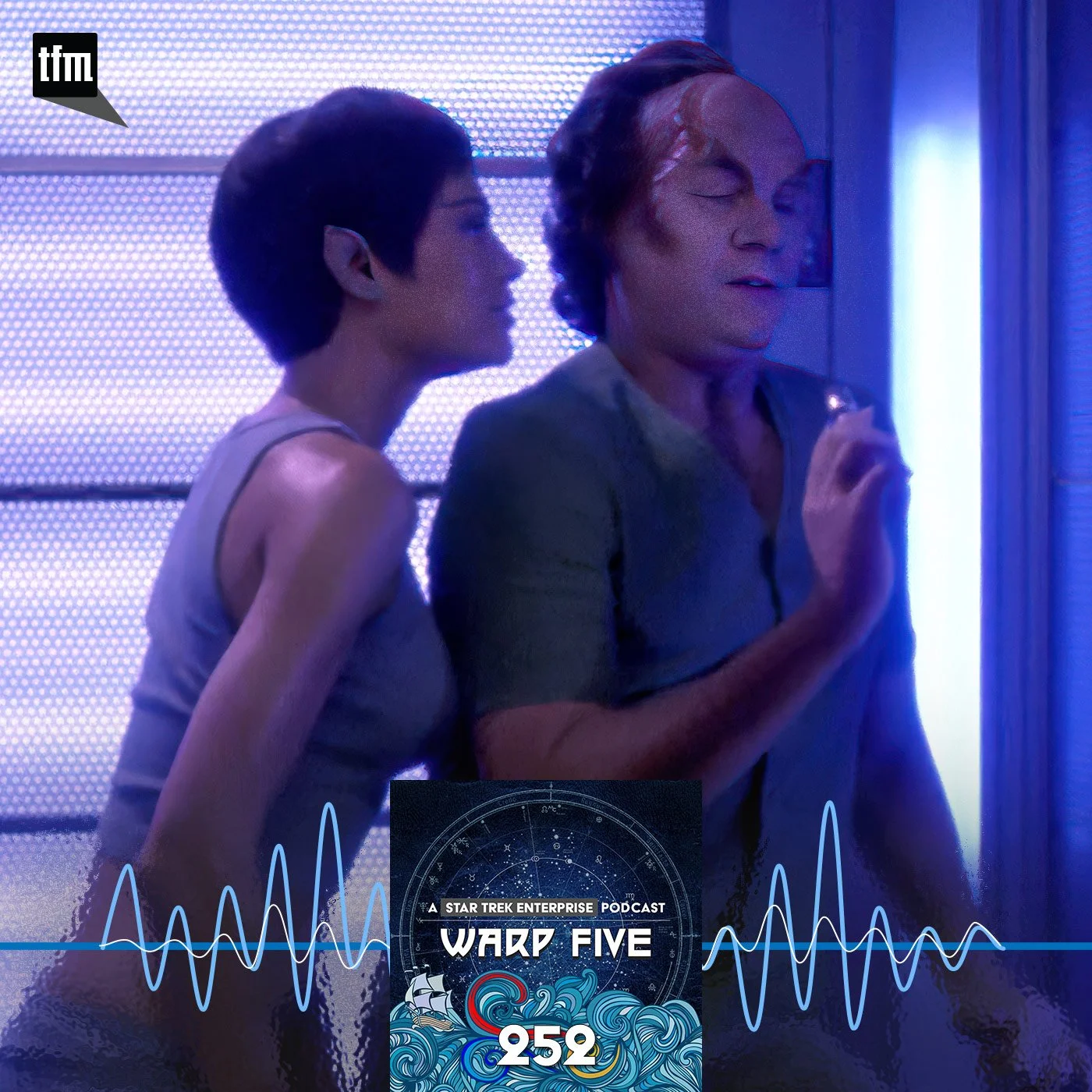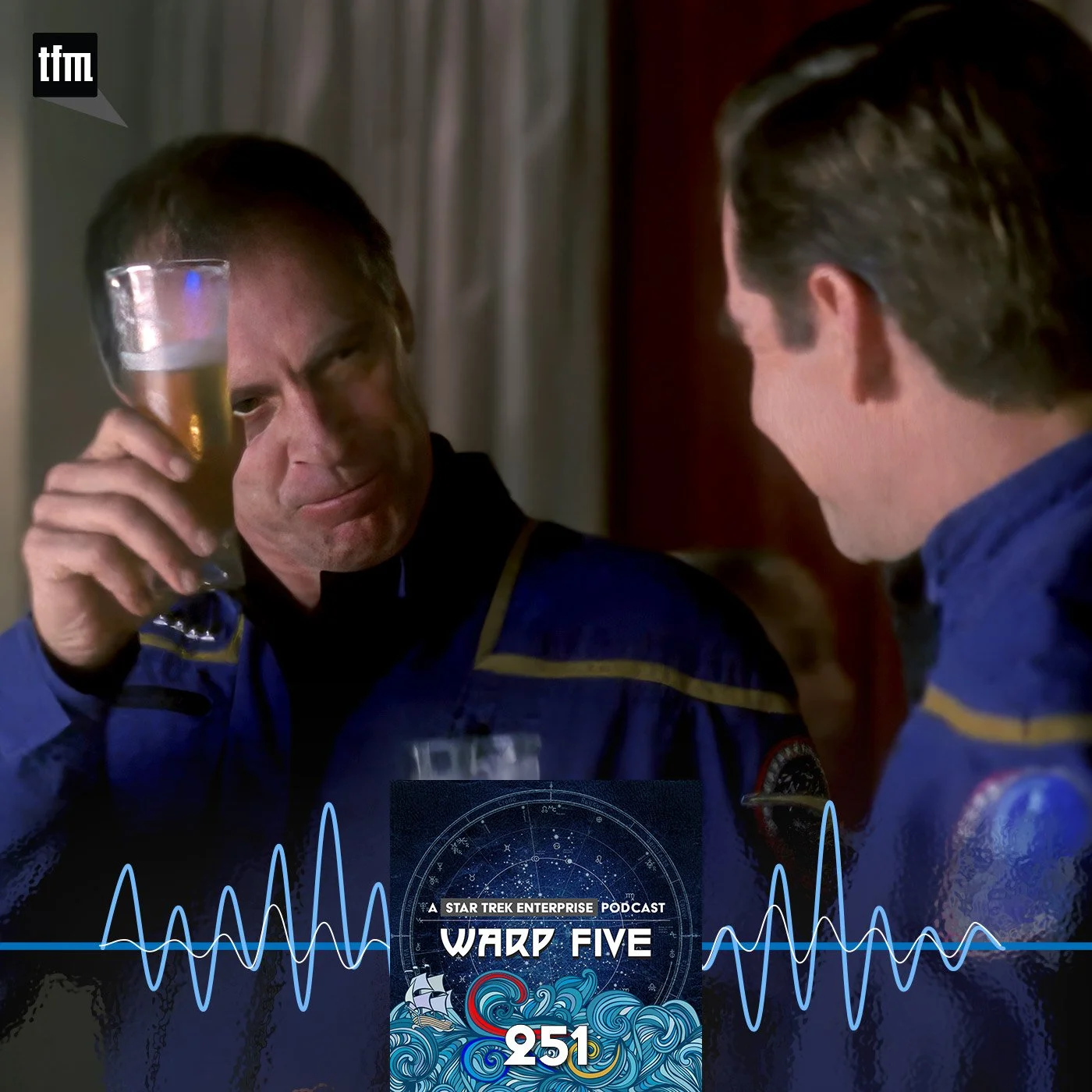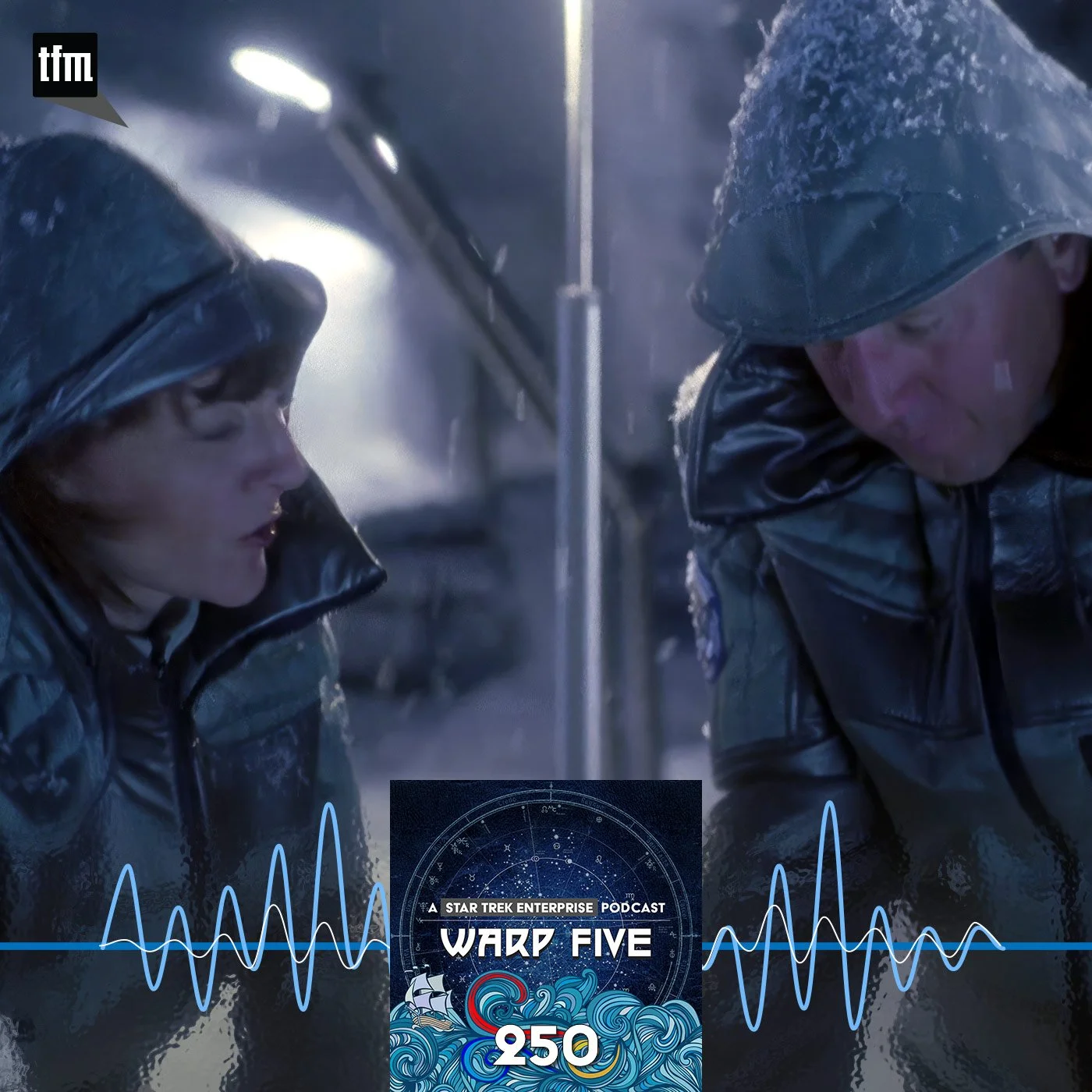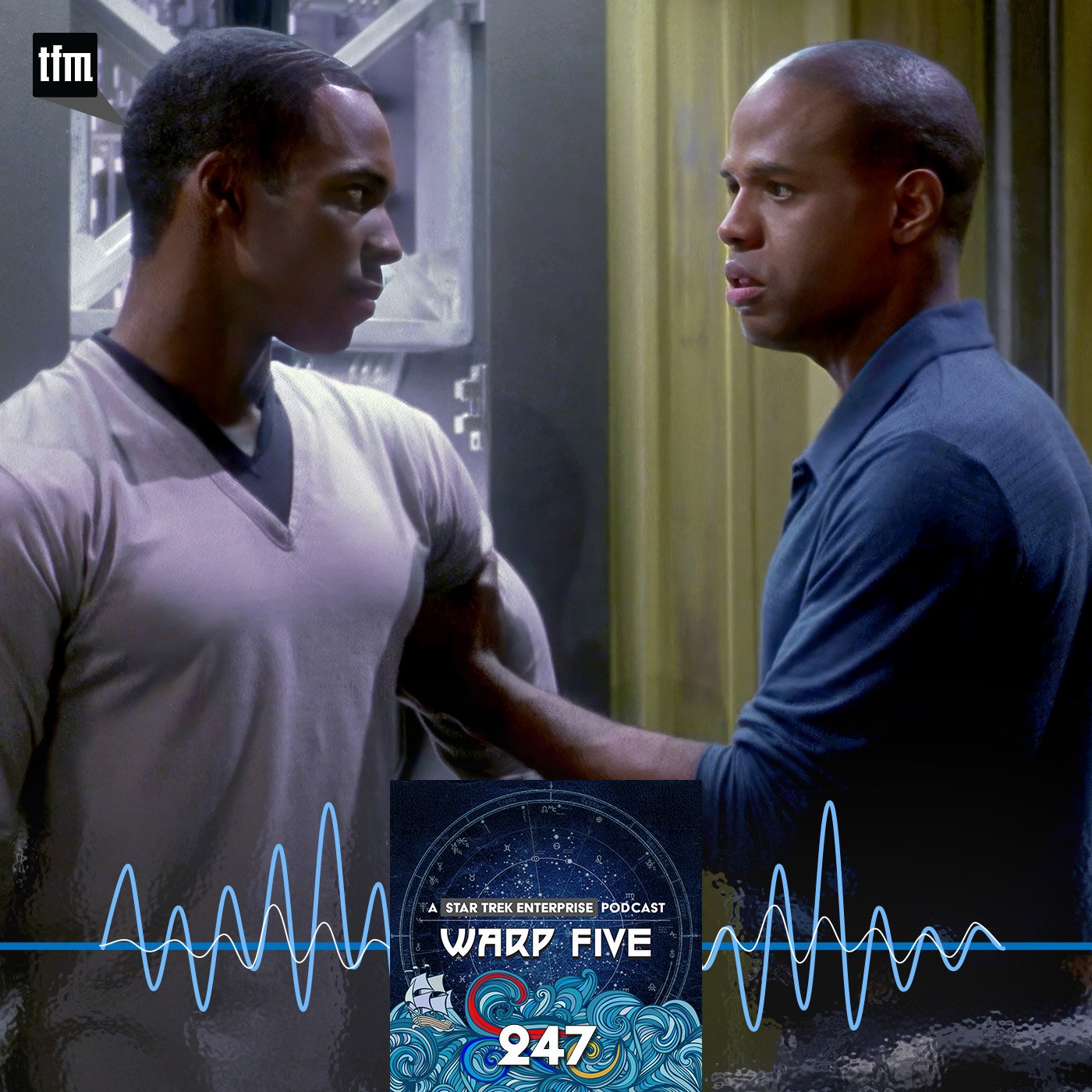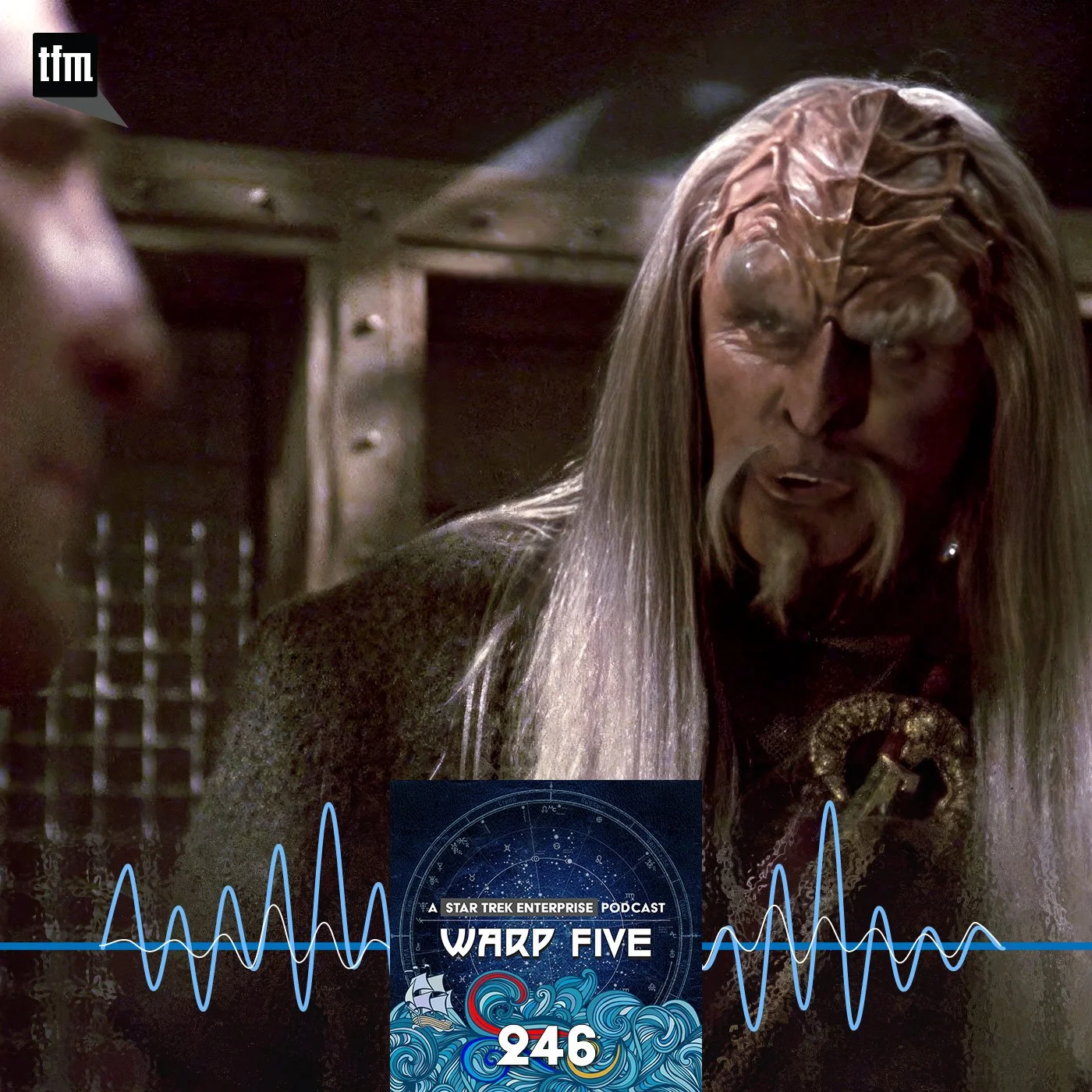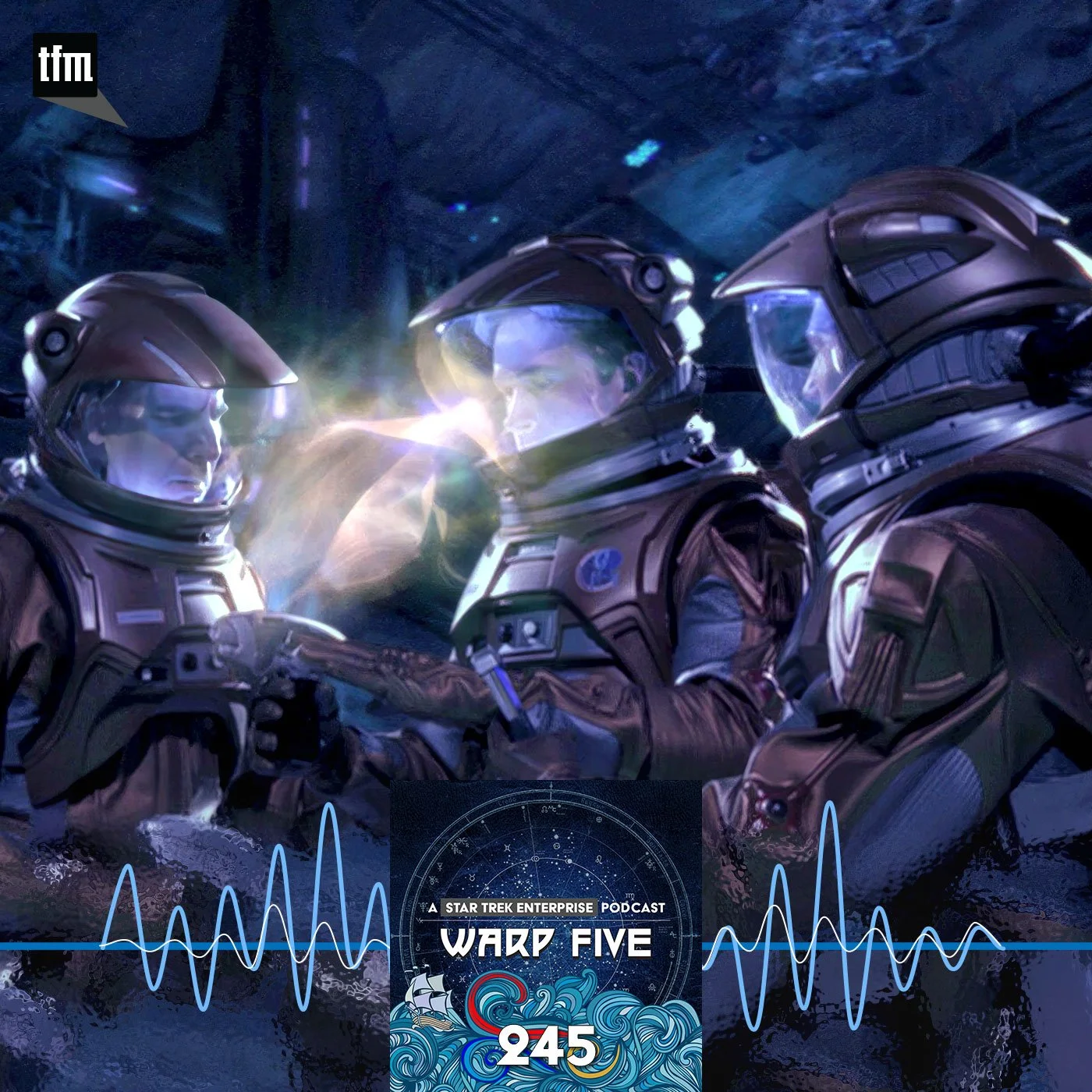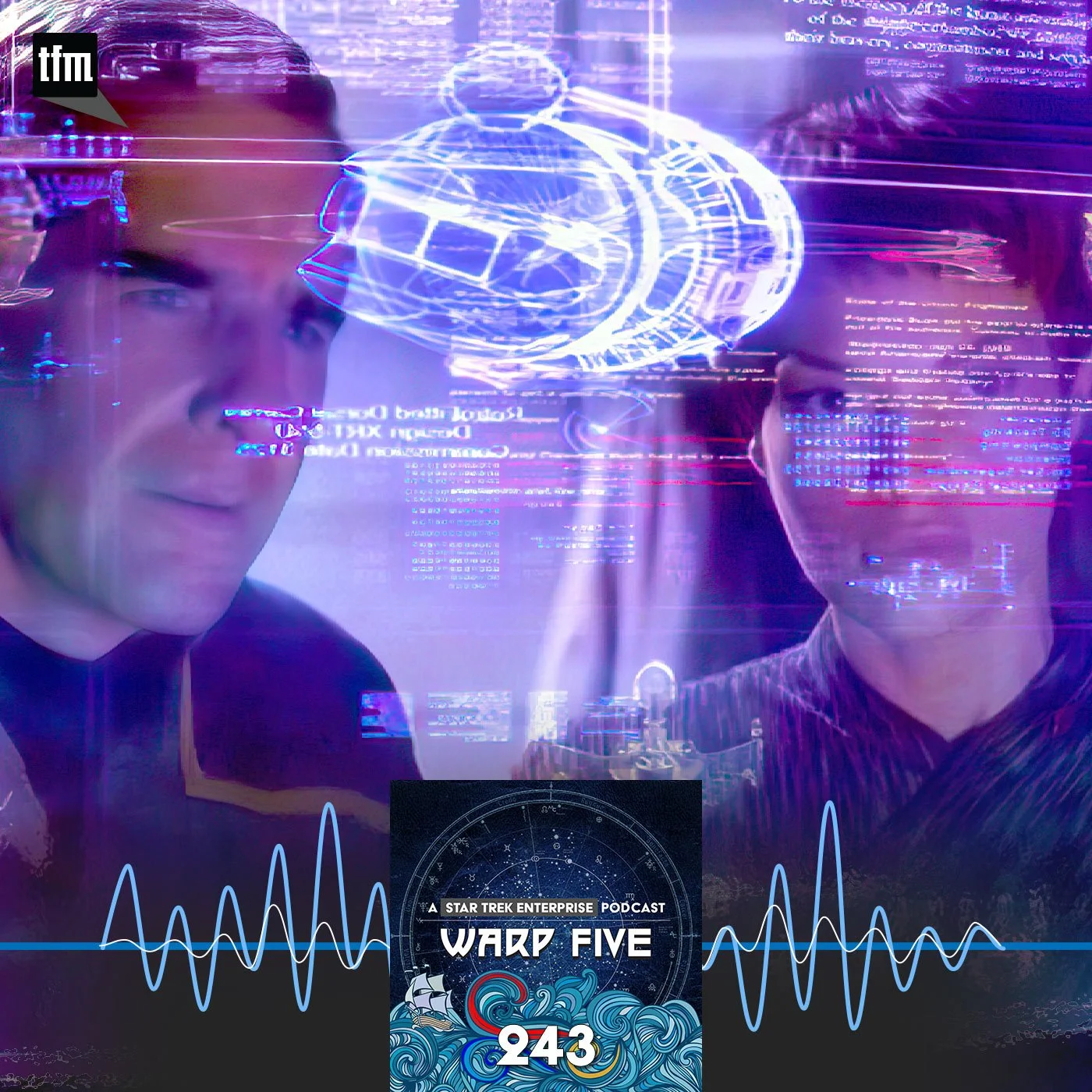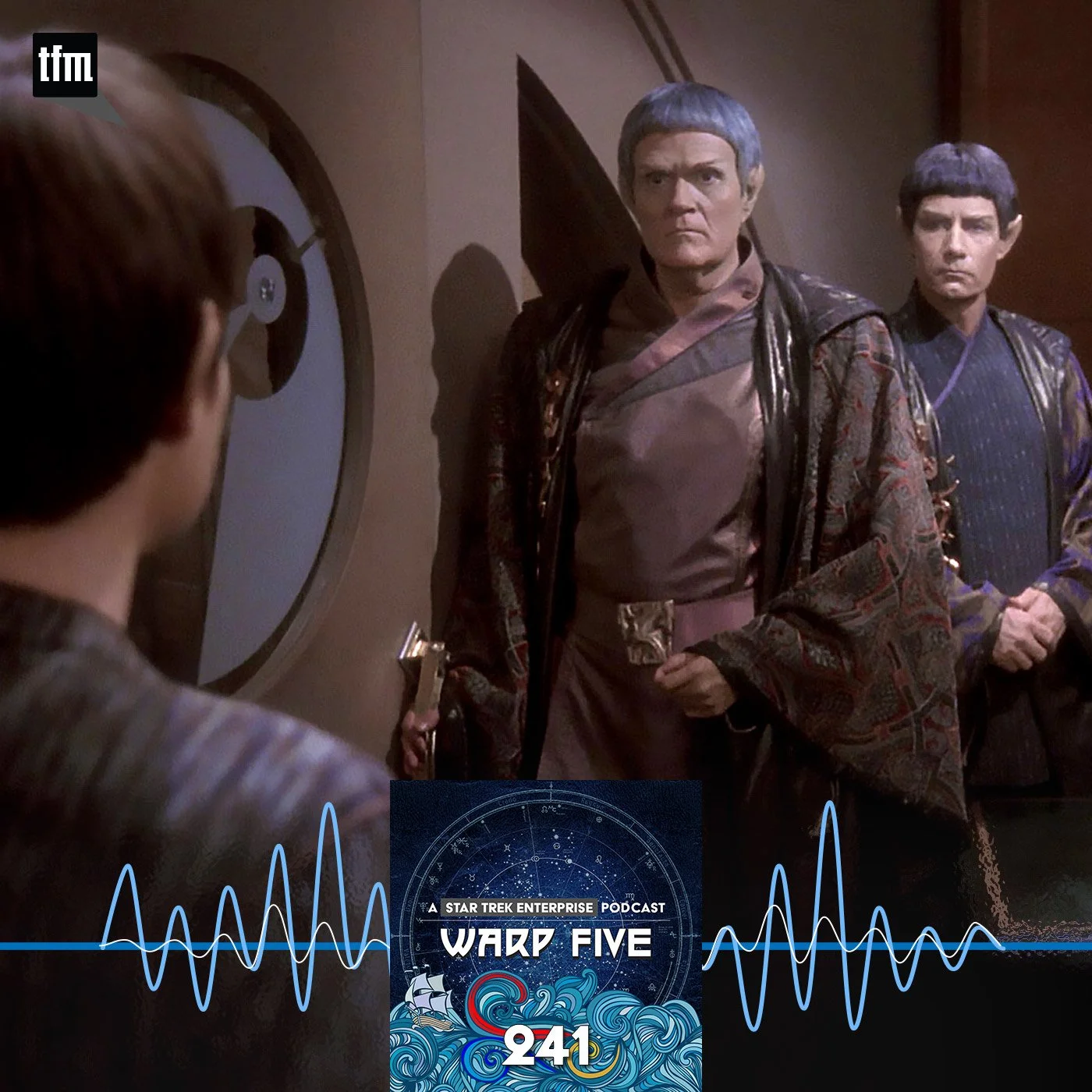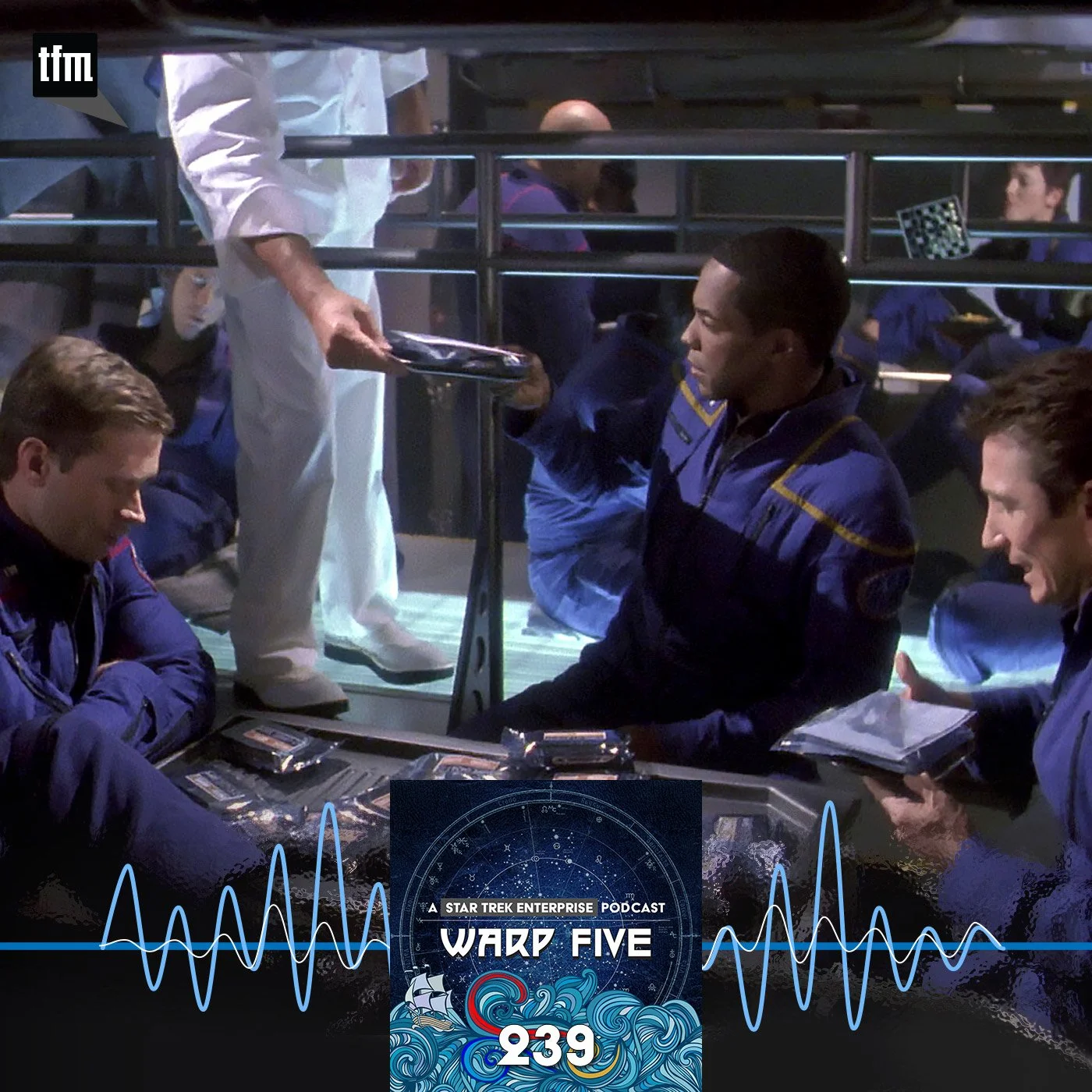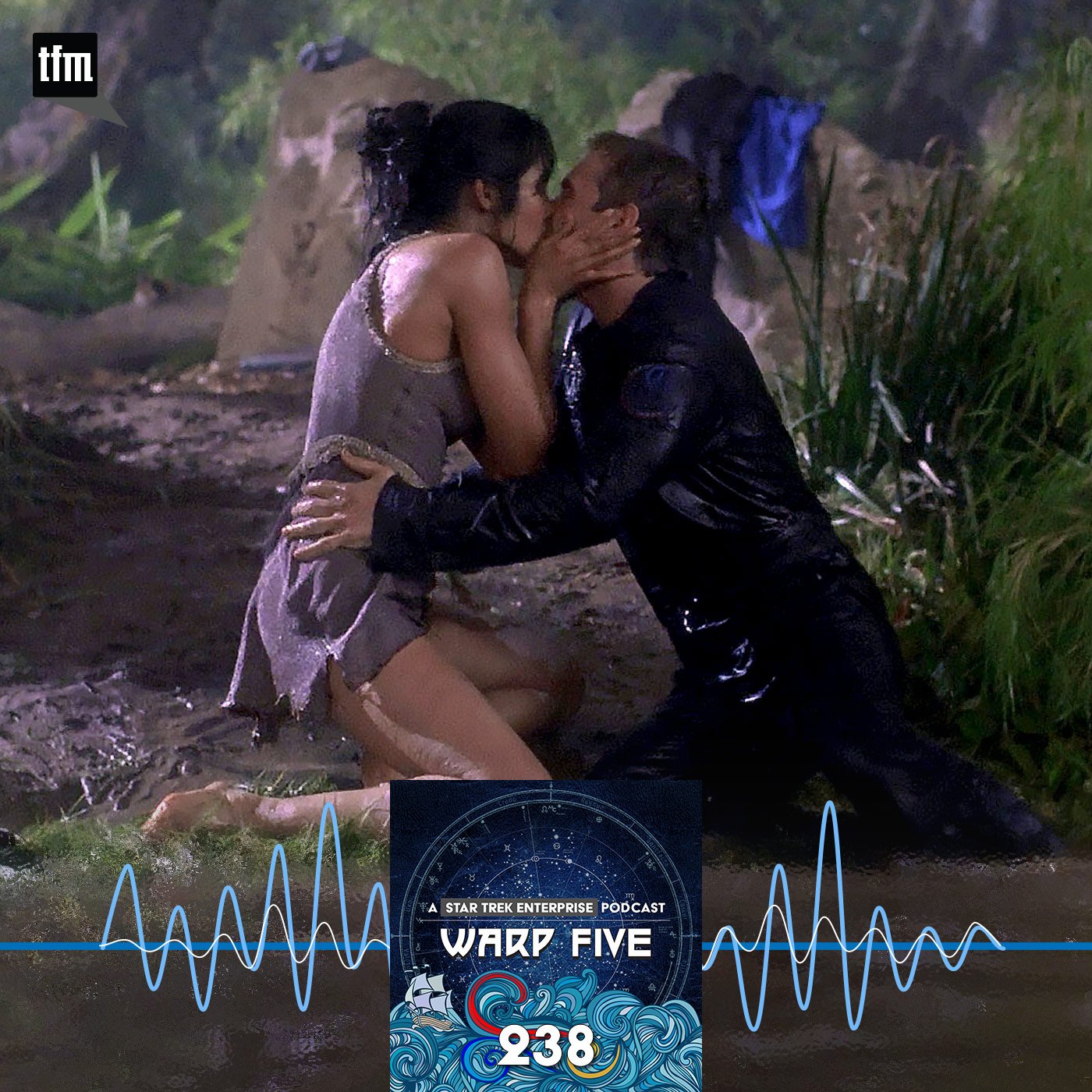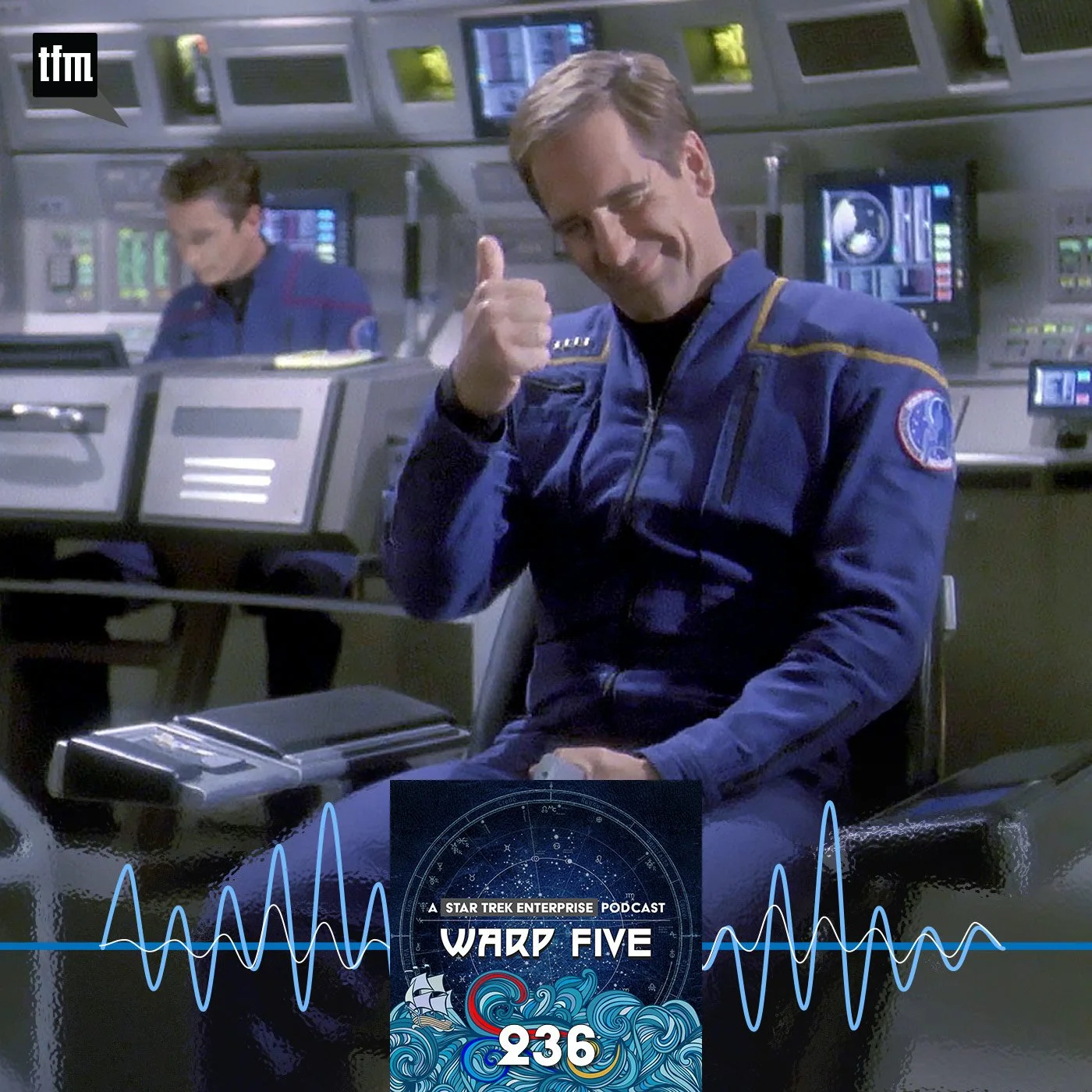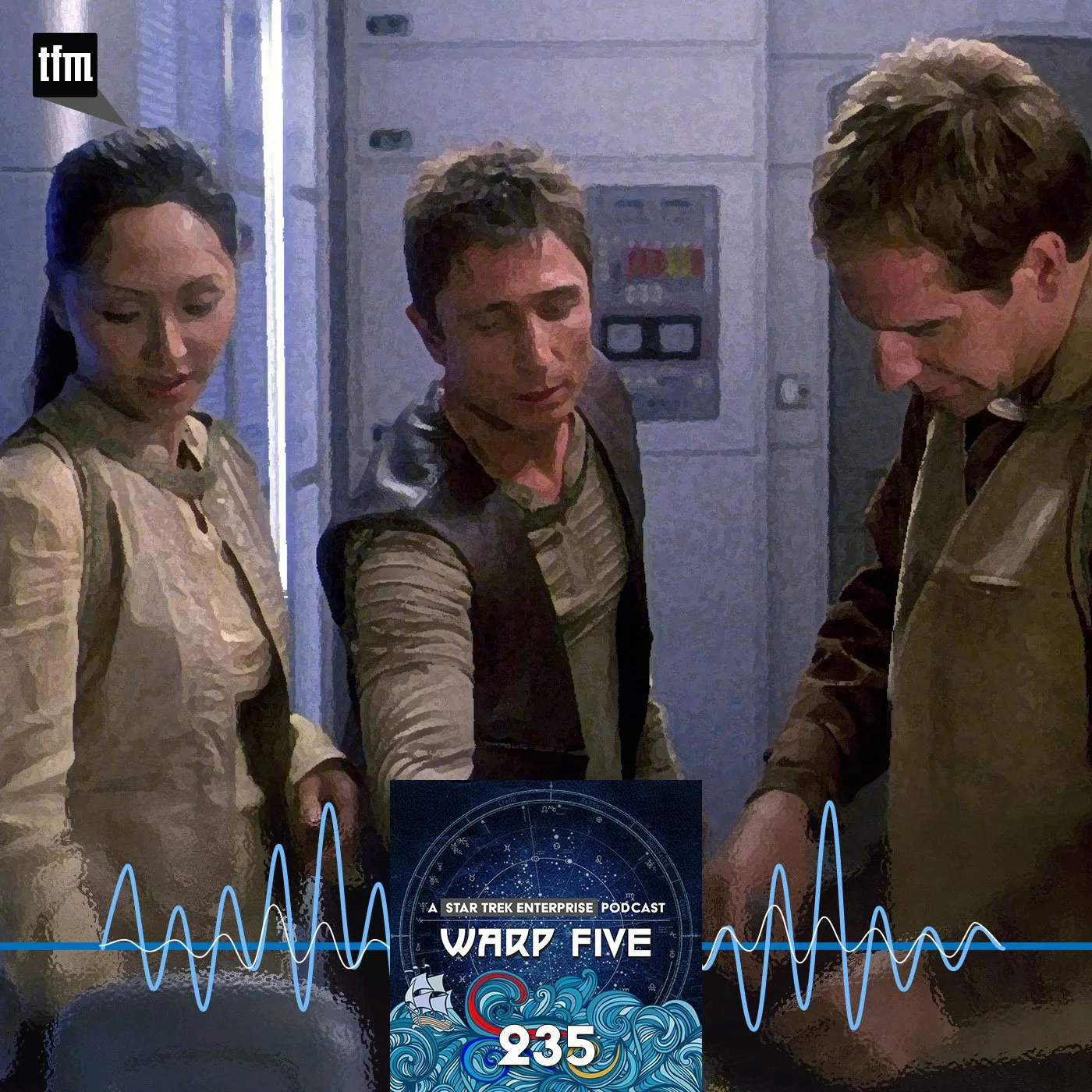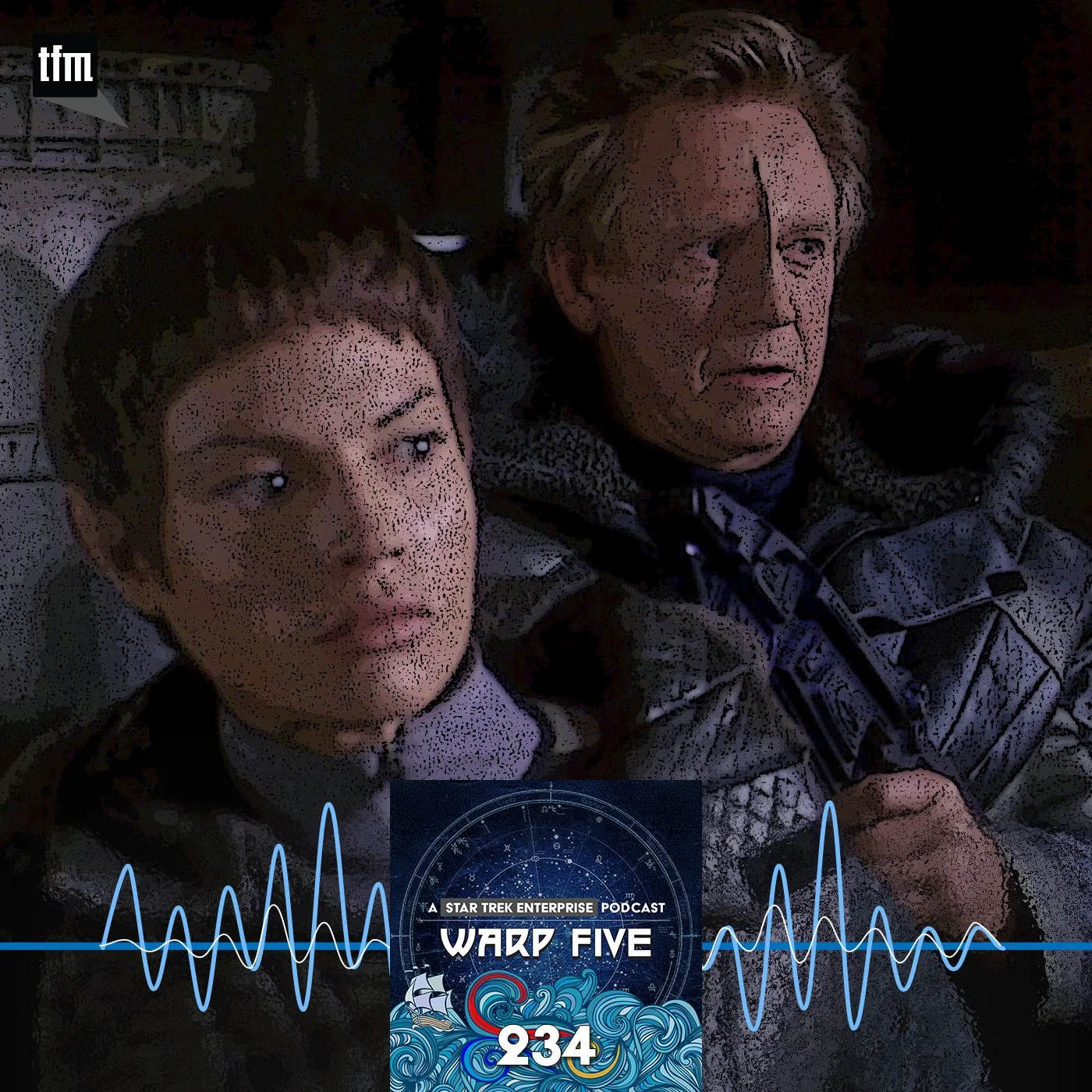Season Four Retrospective, Part Three.
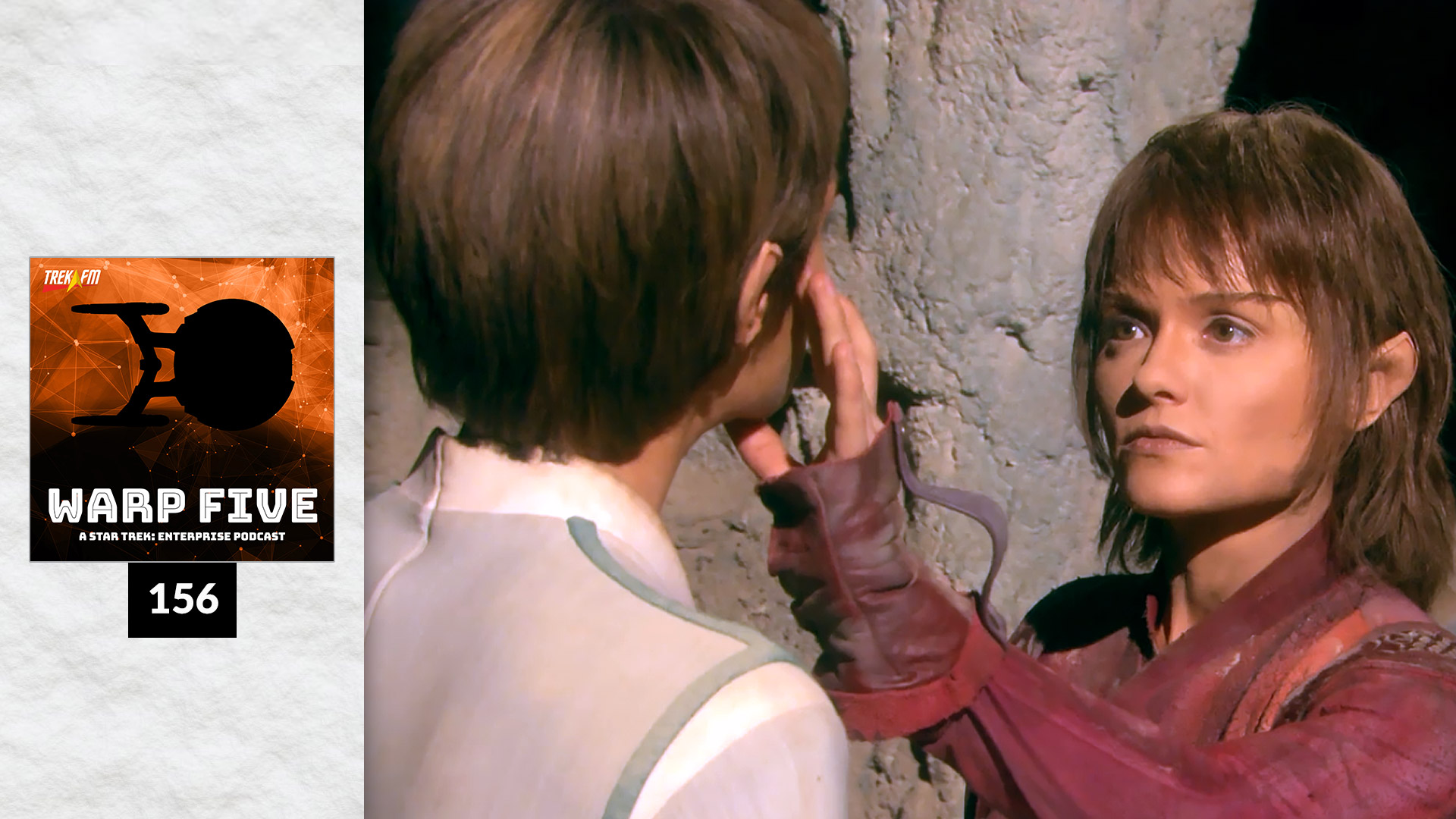
Running Time: 1 hour 22 minutes 21 seconds
Download / RSS / Send us a message / Discuss the show / Support Trek.fm
Every society goes through stages of evolution, often propelled by religion. Such change is not always welcome and is rarely easily accepted. There will always be those who feel they are losing power and try to silence those who bring new knowledge to light. But the change eventually becomes the norm—at least until others with more knowledge begin the cycle again. And this can happen on any world, as we see in fourth season of Enterprise in what has come to be known as The Vulcan Trilogy.
In this episode of Warp Five, hosts Patrick Devlin and Brandi Jackola welcome Brandon-Shea Mutala of Melodic Treks and NX-01 relief tactical officer Jim Moorhouse to discuss “The Forge,” “Awakening,” and “Kir'Shara.” We explore technological inconsistencies, fan service done right, Shran Solo, and how this three-parter made Star Trek: The Animated Series canon.
Chapters
Intro (00:00:00)
The Forge (00:12:59)
Awakening (00:37:06)
Kir’Shara (00:48:58)
Final Thoughts (01:08:05)
Closing (01:15:01)
Hosts
Patrick Devlin, Brandi Jackola, and Brandon-Shea Mutala
Guest
Jim Moorhouse
Production
Patrick Devlin (Editor) Brandon-Shea Mutala (Producer) C Bryan Jones (Executive Producer) Matthew Rushing (Executive Producer) Ken Tripp (Executive Producer) Norman C. Lao (Associate Producer) Floyd Dorsey (Associate Producer) Mike Morrison (Associate Producer) Tim Cooper (Associate Producer) Justin Oser (Associate Producer) Mark Flessa (Associate Producer) Chris Tribuzio (Associate Producer) Richard Marquez (Production Manager) Tony Robinson (Show Art) Brandon-Shea Mutala (Patreon Manager)
“North Star” 20th-anniversary reflections. We discuss the story's classic roots, its message about prejudice and isolation, and how it works as a breather within the Xindi arc.
“Twilight” 20th-anniversary reflections. We discuss Mike Sussman‘s clever concept, the story’s Voyager origins, and how it raises the stakes for the rest of the season.
“The Shipment” 20th-anniversary reflections. We discuss how the episode quickly pushes the Xindi story forward, its nuanced look at conflict and trust, and a fun science fiction take on alien tech.
“Exile” 20th-anniversary reflections. We discuss Star Trek's attempt to do Beauty and the Beast in space.
“Impulse” 20th-anniversary reflections. We discuss how the story flips the Human–Vulcan narrative and accelerates T'Pol's character development.
“Rajiin” 20th-anniversary reflections. We discuss Xindi motivations, Rajiin's reality, Archer's hard knocks journey, and how this installment advances the overall story.
“Extinction” 20th-anniversary reflections. We discuss the quiet exasperation we feel while watching Archer, Hoshi, and Malcolm crack open a grub-filled coconut.
“Anomaly” 20th-anniversary reflections. We discuss how the Expanse changes people, the mystery of the spheres, and more.
“The Xindi” 20th-anniversary reflections. We warp into Season 3 as we discuss how the series takes a dark turn with a new mission, sexy character tension, and an upbeat retooling of everyone's favorite theme song.
“The Expanse” 20th-anniversary reflections. We close out Season 2 by saying bye-bye to Duras and hello to bigger fish as we discuss how the story sets the show on a new course.
“Bounty” 20th-anniversary reflections. We discuss how the story marks the end of the show’s original concept, sets a course for serialization, adds texture to pon farr, and proves that Tellarites are terrible travel guides.
“First Flight” 20th-anniversary reflections. We discuss how the story serves as a resounding proof of concept for the original idea for the series, meeting Trip, how Archer’s experiences with AG Robinson prepared him to be a leader, and more.
“Regeneration” 20th-anniversary reflections. We discuss using the Borg at a time long before they were known to Starfleet, how to do a prequel right, how the story sets up Archer and his crew for the challenges of Season 3, and more.
“Cogenitor” 20th-anniversary reflections. We discuss first contact, equal rights, cultural relativism, missed opportunities, and why we wish this important story had been expanded and revisited.
“The Breach” 20th-anniversary reflections. We explore caves and discuss lingering animosity, overcoming preconceived notions, Archer as the voice of reason, adding depth to Denobulans, and that very special guest star.
“Horizon” 20th-anniversary reflections. We discuss family dynamics, what could have been for Travis, Archer’s leadership, T’Pol's book club, and the unxpected connection between the Mayweather and Janeway families.
“Judgment” 20th-anniversary reflections. We discuss how the story revisits The Undiscovered Country, works to maintain continuity, and challenges the concept of Klingon society..
“The Crossing” 20th-anniversary reflections. We discuss the story’s promising start, the Wisps, Archer’s actions, and missed opportunities to really explore the heart of Star Trek.
“Canamar” 20th-anniversary reflections. We discuss the frightening encounters humans have with aliens during these early days of deep space exploration, how the story came to be, and what it has to say about attempts to control people and curb crime in real world societies.
“Future Tense” 20th-anniversary reflections. We discuss how the story reminds viewers that the Temporal Cold War storyline still exists while saving itself from filler status by delivering important chartacter growth for T’Pol, plus some fun with time along the way.
“Cease Fire” 20th-anniversary reflections. We discuss how the story brings the Federation’s founding worlds closer together through a growing relationship and trust among unlikely players.
“Stigma” 20th-anniversary reflections. We discuss how this story, which aired during Viacom’s HIV awareness campaign in 2003, advances the development of Vulcan society while deftly balancing serious and comedic stories to make a strong statement about cultural differences and unfounded prejudice.
“Dawn” 20th-anniversary reflections. We ask whether this story is just an attempt to recreate the magic of “Darmok,” a clone of the film Enemy Mine, or something much more.
“The Catwalk” 20th-anniversary reflections. We discuss how a bag of Star Trek tropes is reassembled into a story which only this series could tell, and how the situation brings the whole crew together for the better.
“Precious Cargo” 20th-anniversary reflections. We discuss why the story is perfect for Trip’s character, try to explain away Padma Lakshmi’s cardboard delivery, revel in bad cop T’Pol, and consider why the creators themselves see this as one of the worst episodes they ever produced.
“Vanishing Point” 20th-anniversary reflections. We discuss how the mind plays tricks on us, boogeymen in the transport beam, and how the story’s mystery unfolds. We also debate what Mr. Sato’s confusion over physics and family says about how Hoshi views her dad.
“Singularity” 20th-anniversary reflections. We discuss discuss a story that’s been told many times before and ask how well it works this time around. We also search for the ideal klaxon, the perfect soup, and one kick-ass chair.
“The Communicator” 20th-anniversary reflections. We discuss how the story takes a throwaway ending to an Original Series episode and addresses the real-world repurcussions of leaving technology behind on a less-advanced planet.
“The Seventh” 20th-anniversary reflections. We discuss what the episode has to say about Vulcan society, how it connects to the world 20 years after it was written, what is does for the Archer–T’Pol relationship, and more.
“Marauders” 20th-anniversary reflections. We discuss how the story mirrors its Akira Kurosawa inspiration, Seven Samurai, grows the relationship between Archer and T’Pol, and gets the full crew involved.

